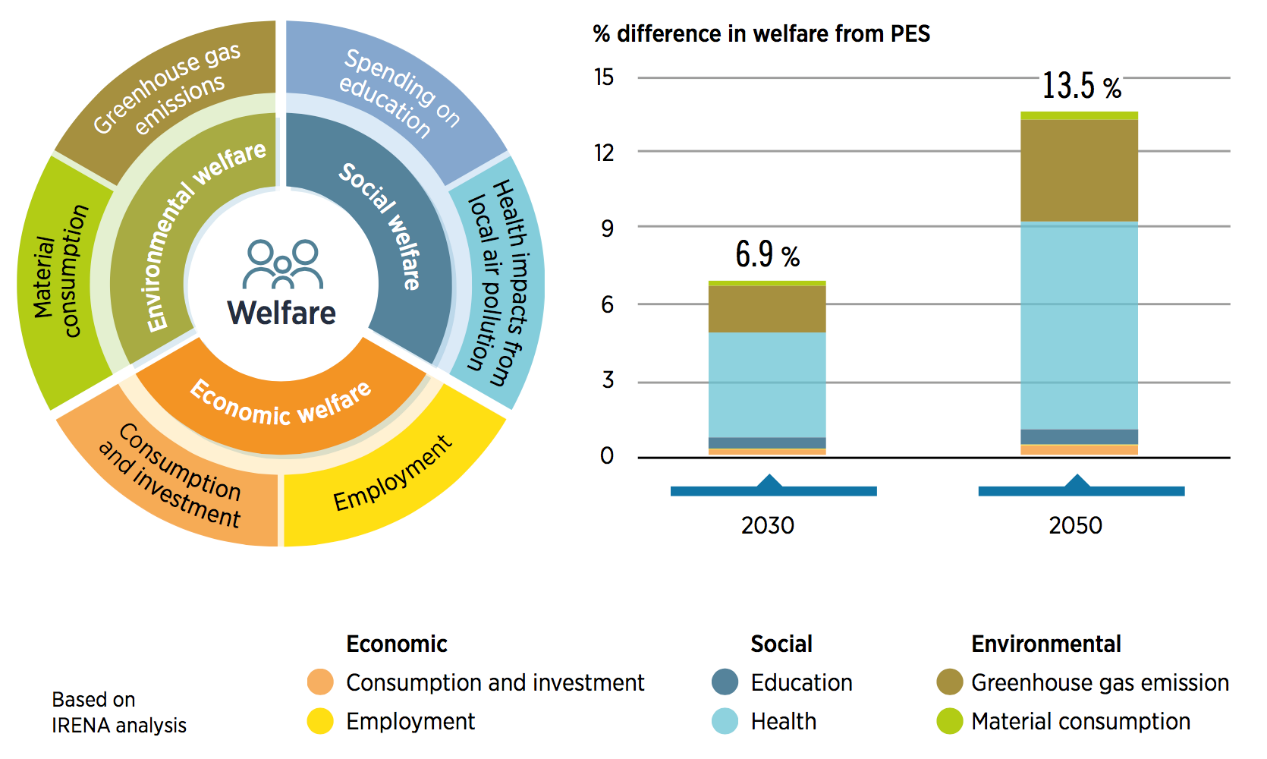

Halfway to 2020, the global pandemic COVID-19 that has ravaged the world has yet to be fully and effectively controlled. The situation in European countries has improved, but countries such as Latin America and South Asia have become new pandemic centers. The pandemic has caused severe impact on the global economy and created uncertainty for the urgent action to address climate change. However, as it spreads, there are a number of climate change and health professionals analyzing and discussing the relationship between climate change and COVID-19, including their causes, health effects and coping strategies. Recently, several countries launched their green economic recovery plans, and the health sector, which is at the forefront of the fight against the COVID-19, has issued their expectations to the heads of many countries, requesting that economic recovery policies should focus on building resilience in healthcare sector.
Green Recovery: Great opportunities for Post-COVID-19’s economic recovery or low-carbon energy transition
The International Renewable Energy Agency recently released the report entitled“Global Renewable Energy Outlook: Energy Transition 2050 ”, which pointed out that the current health, humanitarian, social and economic crisis caused by the COVID-19 pandemic could widen the social gap or accelerate decarbonization.This will largely depend on how countries adopt economic stimulus measures.Ensuring sustainability, strengthening resilience and improving people's health and well-being will be the top priorities [1].
Figure 1: Global welfare indicators under the Energy Transition Scenarios in 2030 and 2050 (Light blue: health indicator; Brown: GHG emission indicator) [1]

Green and healthy economic recovery measures will obtain benefits that far exceed input,especially health benefits. The report believes that the rate of return on accelerating renewable energy deployment and efficiency measures is many times higher than the cost.In terms of energy transition, every dollar spent on energy transition will bring a return of 3 to 8 dollars. The report analyzes global welfare indicators under the energy transition scenarios in 2030 and 2050, and the results shows that health benefits and greenhouse gas emission reductions account for the largest proportion of each indicator.
On May 4, 2020, the United Nations Framework Convention on Climate Change (UNFCCC) published an article stating that as governments respond to the economic impact of COVID-19, there is a growing demand for "Better Recovery" to ensure that the trillions of dollars that governments spend on recovery plans are invested in low-carbon and resilient economies[2]. At the annual virtual meeting of the St.Petersburg Climate Dialogue held at the end of April,”Better Recovery”was the main focus of the meeting. The ministers pledged to achieve a green recovery and continue to advance the ambitious Nationally Intended Contributions (NDCs) by 2020. The article also mentioned that at the end of last year,the European Union took the lead in taking green initiatives, a "Green New Deal" worth 1 trillion euros, and promised to achieve net zero greenhouse gas emissions by 2050. Despite the COVID-19 pandemic, European leaders have repeatedly stressed the agreement and confirmed that the framework of the plan will become the basis of measures to stimulate economic recovery in the Post-COVID-19 era. In addition, leaders of countries and regions such as Germany and the Uinted Kingdom stated that green development and tackling climate change have been included in their Post-COVID-19 economic recovery plans.
Public Health: Buidling the cornerstone of balanced economic and social development in the Post-COVID-19 era
Coping with climate change and pandemic outbreaks requires socio-economic systemic changes. Josh Karliner from Health Care Without Harm believes that a series of systematic changes should include a strategy to achieve climate justice and healthy equality, such as constructing a climate-smart medical system, mitigating greenhouse gas emissions, protecting forest resources and exercising leadership in healthcare sector[3].
In May 2020, the Global Climate and Health Alliance,the World Health Organization and other institutions jointly launched an open letter signing action called "Health Recovery“. The open letter requires the heads of G20 to include investments in public health and environmental management in their economic recovery plans, adopt wise incentives and restrains to build a healthier and more resilient society, support renewable energy, and invite health experts to participate in emergency stimulus plans. As of May 26, over 350 organizations from more than 90 countries representing 40 million health workers and over 4,500 health professionals have signed the open letter[4].
Despite the lack of healthcare systems and medical supplies, frontline healthcare workers risked their lives to cure and treat the COVID-19 patients. In the strategic design and implementation of economic and social development in the post-pandemic era, healthcare personnel should be indispensable participants.
Conclusion: Let “Green Recovery” lead to systemic changes in combating climate change
“Green Recovery” emphasizes the development of a low-carbon economy and renewable energy system,considering the long-term challenges of addressing climate change. “Green Recovery” will highlight policymakers' determination: coordinate post-pandemic economic and social development with climate change,jointly advance economic recovery, strengthen global pandemic prevention capabilities and global cooperation, and achieve the Paris Agreement long-term temperature goal which aims to limit global temperature rise to well below 2 degrees Celsius.
Note:
[1] IRENA:Global Renewables Outlook, Energy Transformation 2050. https://www.irena.org/-/media/Files/IRENA/Agency/Publication/2020/Apr/IRENA_Global_Renewables_Outlook_2020.pdf
[2] United Nations Climate Change, Support grows for a “Better Recovery” from COVID-19, https://unfccc.int/news/support-grows-for-a-better-recovery-from-covid-19
[3] Josh Karliner, “Coronavirus and the climate crisis: Common causes and shared solutions”, https://medium.com/@HCWH/coronavirus-and-the-climate-crisis-227c36bf07d0
[4] Healthy Recovery,https://healthyrecovery.net/
Author: Jiang Chao
Proofread by Ang Zhao
Translated by Lu Ye
This article is the original article by Rock Environment and Energy Institute
For cooperation and authorization, please send email to: liying@reei.org.cn




